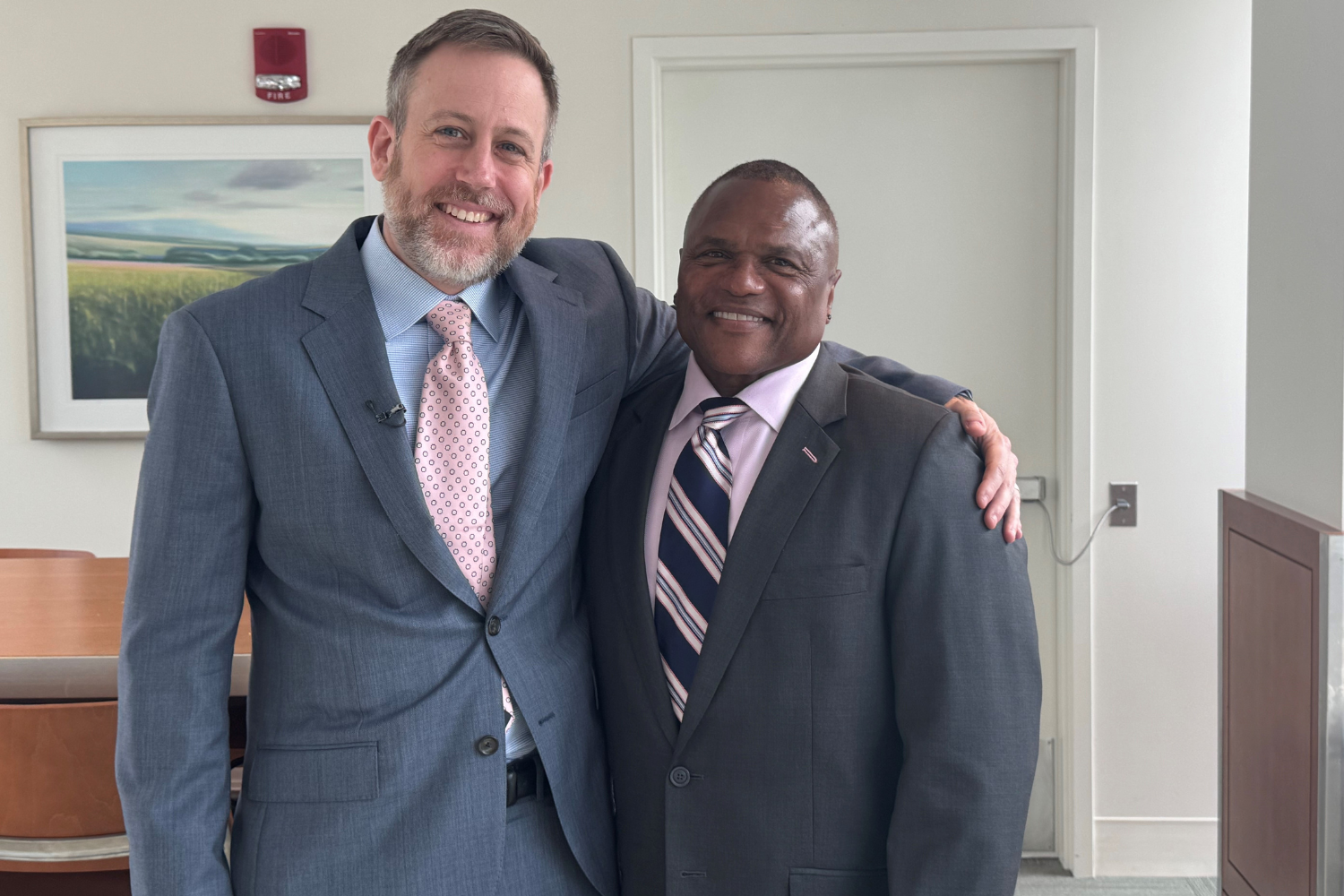David A. Yalof, professor of political science and head of the Department of Political Science at UConn, is a specialist in constitutional law, judicial politics and Executive Branch politics. He is the author of the books Prosecution Among Friends: Presidents, Attorneys General, and Executive Branch Wrongdoing (College Station: Texas A & M University Press) and Pursuit of Justices: Presidential Politics and the Selection of Supreme Court Nominees (University of Chicago Press). With the nomination of Circuit Court of Appeals Judge Amy Coney Barrett to fill the seat of Associate Justice Ruth Bader Ginsberg, UConn Today spoke with him about the history of selecting justices for the Supreme Court of the United States and today’s political environment.
This is not the first time a Supreme Court nomination is coming close to an election, but it follows a nomination during the last year of the Obama Administration when the Senate leader, Mitch McConnell, said the next president elected should make the decision on the nominee. Now he’s changed his mind about that and is pushing for a nominee. John Adams and Thomas Jefferson had a bit of a dust-up early on in the history of the country when voting for the president and the vice president were not on the same ticket and whoever finished second in the presidential election became the vice president. Adams lost the election and nominated somebody to the court before Jefferson was inaugurated.
We’ve seen this where the political machinations of appointments and all the things that have to happen to make our government go don’t stop simply because we are in a presidential election year. You have two periods that cause confusion; the first period, which we’re going through right now, is the period leading up to an election and everybody is focusing on that. That creates two issues. The first issue is: can we really deal with these other side issues — a Supreme Court appointment, a pandemic – and can we deal with them effectively while we have the clash of titans of two major parties taking place. They’re going to be inextricably intertwined and it’s going to be very hard to separate one from the other. When you’re talking about Jefferson and Adams, of course, you’re talking about a lame duck period. After Adams had lost to Jefferson in the presidential election of 1800 there was a fully four to five month period between that election and the inauguration of Jefferson. Back then the inauguration wasn’t until March. We now do it, as you know, in January. So during that period Adams rammed through a whole bunch of federal judgeships with Federalists placed in there. There wasn’t a lot that Jefferson could do until he took office and he decided, well, those who don’t have their money yet might not get paid. That was a lame duck period issue and we’ve certainly seen that in the past. What we’re dealing with now is the lead-up to a presidential election and side issues like the Supreme Court and dealing with the pandemic and the economic recession, all of those issues end up being swallowed up by the presidential election. Everything is thought of in those terms, and it makes it hard to have a genuine, full-throated, honest debate. No surprise. Those are the issues that I think we’re seeing now with the Supreme Court nomination.
When we spoke during the Brett Kavanaugh nomination and the lead-up to the Trump impeachment, you noted that with the 2020 election ahead, people would focus voting on economics and their views on things like immigration. I’m wondering what you’ve been thinking about with the election less than a month away, and especially after the recent revelations about President Trump’s tax history?
When we were discussing impeachment, there was no pandemic; there was not the economic crisis that we suffered through the second quarter of 2020; there was no Supreme Court vacancy the Republicans were eagerly hoping to fill before the election. I gotta tell you, talk of impeachment just seems years ago. I think that a large chunk of Americans may have even forgotten that he’d ever been impeached because so much has happened since January of this year. I don’t know if you remember, there were also a lot of fires going on in California and you still have that but it seems like everything from before the pandemic has been forgotten. All we’re focusing on now, of course, is this battle for 270 votes [in the Electoral College]. We have a Supreme Court vacancy going on, the pandemic continues with record numbers of deaths. We have 4% of the world’s population and we have five times that many COVID cases, so we’re not doing well as a country. And, all of that has to be accounted for while the two candidates can’t even campaign in a normal way because of the social distancing and all of the problems caused by the pandemic. It’s really quite an amazing period.
The history of these conflicts in Supreme Court nominations in modern times goes back to the Abe Fortas nomination, who Lyndon Johnson wanted to elevate to chief justice. Then there was the Robert Bork nomination following the Watergate scandal. You have articulated, as have others, about the contentiousness in the system and in the country and it doesn’t look like this is going to get any better anytime soon. After the Kavanaugh hearings, people seem to want maybe to step back a bit now, with the Amy Coney Barrett nomination. What are your thoughts on where we are now, given all that history?
The Abe Fortas nomination was Lyndon Johnson’s attempt to replace Chief Justice Earl Warren with Fortas, who was already on the court as an associate justice. I think that’s a very good way to consider a baseline for what we’re going through today because that was during a presidential election. It was in July but it was in the heat of an election [in 1968] that obviously had the vice president under Lyndon Johnson, Hubert Humphrey, battling it out with Richard Nixon. How was that different? Lyndon Johnson was not going to be the president; he was not running for re-election. It should be said that the process did go forward. Unlike with Merrick Garland [in 2016], there were hearings held. The Republicans couldn’t do much about it, just like the Democrats couldn’t do much about it in 2016 because they didn’t control the Senate. But the Republicans did force a filibuster of a sort. They were able to avoid the Democrats invoking cloture [the process of ending debate for a vote]. As a result, the Fortas nomination died and the next chief justice did not become a stalwart Democratic liberal friend of Lyndon Johnson; the next chief justice became Warren Burger, Richard Nixon’s choice. Power matters, elections matter.
Right now, the current election does not matter for what’s going on in American politics. The Republicans hold the presidency, they hold the Senate, and as long as there is a vacancy, they’re going to go forward with it. This is really an important point. The Republicans, by denying Merrick Garland, did not violate the law or violate the Constitution. By running Amy Coney Barrett through very quickly, they’re not violating either of those, as well. What they are doing is violating norms, and these norms date back for over half a century, if not three quarters of a century, that during a presidential election, you don’t ram these through. You play it out and possibly let the next guy decide who gets to be that nominee; you don’t have this whole thing happen in such a short period of time. That was a period when the Senate was a different body than it is today. There was much more comity, much more collegiality. Nobody wanted to shake everything up because they knew they might be on the wrong side of it the next time. That doesn’t matter anymore. This is too important to Mitch McConnell. I think his and the Republicans’ support for Amy Coney Barrett and for moving this process forward is based on one thing: it’s based on the fact that this is a high priority for them. They’re going to make this happen and the consequences, let them be the consequences.
What I think is interesting about this situation is that for the Republicans and the conservatives who already support Trump, they love the fact that he’s pushing this through. But they’re already voting for Donald Trump, and for the liberals and the Democrats who hate Trump, they are angry at him, but they’re already voting against Trump. The real question is: what about the 7% who amazingly remain undecided? How do they feel about it? Do they feel there’s a lack of fairness? The polls would seem to indicate that they do have a problem with rushing this through so quickly and maybe to an independent, who’s not on one side or the other, there is something that feels a little unfair, that Obama only got two in eight years, whereas Donald Trump gets three in less than four years. That’s the real question. Could that actually influence the election? It may not be the way Mitch McConnell wants it to be influenced, but for him and his party, this is a priority.
Because of the ideology of the court, questions of textualism and originalism get raised when deciding who should be put on the court. Textualism is interpreting laws and legal documents only by the words used in those documents, versus originalism, where you look at the history of what the Founders put in their writings and the interpretation of what the Founders really meant. So this becomes the ideological battle. This is potentially a severe move to the right compared to where the court has been in recent years. From your perspective, where does this sit in the context of where the court’s going and where it could go?
Originalism is very much an important aspect of the Barrett nomination, as you say. She was a clerk of Justice Antonin Scalia, a very outspoken and vocal proponent of originalism. He would say that the text comes first and then originalism comes second, but very often texts of constitutional and other items are very vague. So looking and trying to see what the Founding Fathers meant when they passed this, or what the earlier Congress meant when they proposed an amendment or ratified, that would seem to be a tool in the judicial arsenal. The catch, of course, is like going to a party where you tend to find your friends. The Founding Fathers are all over the place in many of these instances. They didn’t agree on a lot of things. So you get into a situation like the 1995 term limits case where the Supreme Court struck down the attempt by states to term-limit federal officials like members of Congress. The majority [of the court] said unequivocally, the Founding Fathers did not want these kinds of term limits. And the dissent had just as many Founding Fathers’ talking about the willingness to allow states to make these restrictions. So you’re right back in this conundrum. There are no clear answers. I would warn you and everybody else; I think there’s a tendency to say, Judge Barrett clerks for Justice Scalia so she obviously will follow in his footsteps. Let’s not forget that Judge Kavanaugh, now Justice Kavanaugh, clerked for Justice Anthony Kennedy. If we expect her to follow her justice, are we going to similarly expect Justice Kavanaugh to become a swing vote, to protect abortion rights, as Justice Kennedy did in his final years? That remains to be seen.
Our last discussion on nominations was two years ago and you said: “Elections themselves are a fragile thing. At moments like this, we look back and wonder how we got through it. What if President Trump lost and refused to leave?” There has been some discussion of this because the president refused to answer that question recently. It’s been rare, but what happens if the election gets thrown into the House of Representatives? Where do we go from there?
If that becomes the case, this is really uncharted ground; we’re in a whole new ball game. The last time things went to the House of Representatives was the early part of the 19th century and that’s because we have two major parties, not five. As a result, we always seem to get a person who achieves the magic number of 270. We haven’t had the nightmare of 269 to 269, which would throw it to the House, and we haven’t had a situation like we had in 1824 or in other years where nobody reaches a majority of the Electoral College and it’s thrown into the House. It’s hard to tell. Most scholars believe that the new House of Representatives that’s actually elected this year, and would take over January 4th, 2021, they would be the ones in charge of actually casting this vote, and what should be said is that, the House Representatives doesn’t simply vote as party members. Because if that was true, obviously the Democrats control the House, and we would expect them to vote for the Democrat. In fact, the House of Representatives in this situation, they would be forced to meet as states.
Right now in the current House of Representatives, which I don’t think would be the deciding body, there are 26 states where the state coalition is controlled by the Republicans and there are only 22 that are controlled by the Democrats. That’s because, while the Democrats have a significant edge, Wyoming and North Dakota and South Dakota, and all of these state coalitions are controlled by Republicans. It adds up to more. Would that be true after this election? Nobody knows. The other thing is, just because that’s happening, that would put a lot of power in the hands of a few House members to basically go the other way. They would not be bound in any way by how their state voted. So you could really have back room negotiating. [House Speaker] Nancy Pelosi making promises for this and that. It could really be a free for all. I’m not sure it would be a great moment for democracy, but it would be a fascinating thing to see.



